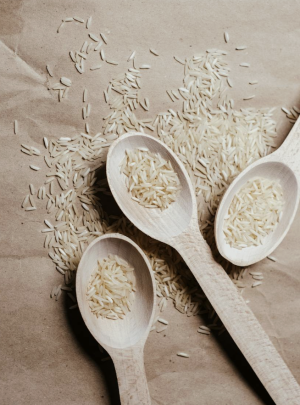Check your pantry: This popular rice brand is being recalled over a surprising safety issue
By
Veronica E.
- Replies 0
If rice is a regular part of your weekly menu, you may want to take a closer look at what's in your pantry.
A major food brand has issued a recall after small stones were discovered in several ready-to-eat rice products.
The affected items were sold at some of the biggest retailers in the country and could pose a safety risk if consumed.
While no one has reported injuries so far, the company is urging customers to double-check their packages.
Here's what you need to know to stay safe and possibly claim a refund.

Why this recall is making headlines
On October 14, the US Food and Drug Administration (FDA) announced that several varieties of Ben’s Original Ready Rice were being voluntarily recalled.
The issue? Small stones were found in certain packages.
These stones are believed to have come from the rice farm itself, though the exact source wasn’t identified.
While rare, these foreign objects could cause injury to the mouth or digestive tract if accidentally eaten.
Out of caution, the company is working with retailers and regulators to remove the affected products from circulation.
Also read: Is your rice safe? A new report reveals findings that may surprise you
Which rice products are part of the recall
If you’ve bought Ben’s Original Ready Rice recently, check your packages for the following names and batch codes.
All affected products share a "Best By" date of August 2026:
Look for the batch code printed near the "Best By" date, typically on the back or bottom of the package.
Also read: From rice and fish to fried bread—how breakfast is served around the world
Where the rice was sold
The recalled rice was distributed across the US through major grocery suppliers including Associated Grocers, C&S, and Dot Foods.
It reached store shelves between August and September and was sold by retailers such as:
If you shop at any of these stores or ordered rice online during that time, it’s worth checking your supply.
Also read: Think it’s safe? This leftover might be more dangerous than you realize
What to do if you have a recalled package
First and foremost—do not eat the rice.
Even if it looks fine, the risk of biting into a stone isn’t worth it.
Instead, follow these steps:
Also read: Highest risk warning issued as mushroom recall expands nationwide
How do stones end up in rice in the first place?
It may seem unusual, but stones can sometimes slip into rice during the harvesting process.
Rice grows in fields where small rocks, soil, or plant debris can be present.
Although modern processing facilities use machinery like air filters, magnets, and even X-rays to catch foreign objects, no system is perfect—especially when handling large volumes.
That’s why recalls like this are an important layer of protection for consumers.
Also read: FDA issues new recall alert—here’s what to check in your kitchen
Why this recall isn’t necessarily a bad sign
While it may be concerning to hear about stones in your food, voluntary recalls like this one are actually a good thing.
They show that companies and regulators are actively monitoring safety and taking quick action when something goes wrong.
The FDA collaborates closely with food manufacturers to spot potential hazards and issue timely warnings.
Consumers can also sign up for email alerts from the FDA to stay on top of future recalls.
Also read: PepsiCo’s latest recall raises concerns for health-conscious consumers
Helpful habits for safer packaged food
Also read: Salmonella outbreak prompts expanded frozen vegetable recall
Rice safety tips you can use at home
Even if your rice isn’t part of this recall, a few simple steps can reduce your risk.
Before cooking, spread the rice on a tray and inspect it for anything unusual.
Rinse it thoroughly under cold water to help remove tiny bits of debris.
Using a fine-mesh sieve can also help catch small particles.
These traditional habits are still helpful today—and worth teaching to the next generation of home cooks.
Staying informed about food recalls is one of the easiest ways to protect yourself and your loved ones from preventable risks.
Whether it’s checking batch codes, rinsing rice, or simply spreading the word to friends and family, small actions can make a big difference.
At The GrayVine, we’re here to help you stay one step ahead—because peace of mind should always be part of the recipe.
Read next:

We’d love to hear your stories. Whether you’ve spotted a surprise in a grocery item or have tips for checking pantry staples, your experience could help someone else avoid a kitchen mishap. At The GrayVine, we believe in sharing knowledge and looking out for one another—especially when it comes to food safety.
A major food brand has issued a recall after small stones were discovered in several ready-to-eat rice products.
The affected items were sold at some of the biggest retailers in the country and could pose a safety risk if consumed.
While no one has reported injuries so far, the company is urging customers to double-check their packages.
Here's what you need to know to stay safe and possibly claim a refund.

A recent rice recall is reminding shoppers to double-check their pantry staples. Image Source: Pexels / Vie Studio.
Why this recall is making headlines
On October 14, the US Food and Drug Administration (FDA) announced that several varieties of Ben’s Original Ready Rice were being voluntarily recalled.
The issue? Small stones were found in certain packages.
These stones are believed to have come from the rice farm itself, though the exact source wasn’t identified.
While rare, these foreign objects could cause injury to the mouth or digestive tract if accidentally eaten.
Out of caution, the company is working with retailers and regulators to remove the affected products from circulation.
Also read: Is your rice safe? A new report reveals findings that may surprise you
Which rice products are part of the recall
If you’ve bought Ben’s Original Ready Rice recently, check your packages for the following names and batch codes.
All affected products share a "Best By" date of August 2026:
- Long Grain White Rice
- 533ELGRV22
- 534ALGRV22
- Whole Grain Brown Rice
- 534AMGRV22
- 534BMGRV22
- 534DMGRV22
- Long Grain & Wild Rice
- 533BMGRV22
- 533CLGRV22
- 533CMGRV22
Look for the batch code printed near the "Best By" date, typically on the back or bottom of the package.
Also read: From rice and fish to fried bread—how breakfast is served around the world
Where the rice was sold
The recalled rice was distributed across the US through major grocery suppliers including Associated Grocers, C&S, and Dot Foods.
It reached store shelves between August and September and was sold by retailers such as:
- Target
- Amazon
- HEB
- Piggly Wiggly
- United Markets
If you shop at any of these stores or ordered rice online during that time, it’s worth checking your supply.
Also read: Think it’s safe? This leftover might be more dangerous than you realize
What to do if you have a recalled package
First and foremost—do not eat the rice.
Even if it looks fine, the risk of biting into a stone isn’t worth it.
Instead, follow these steps:
- Check the packaging for the batch code and date.
- Call Ben’s Original Consumer Care at 1-800-548-6253 for refund instructions.
- Keep the packaging or take a photo of the batch code for your records, especially if you plan to request a refund.
- Dispose of the product safely once you've documented it.
Also read: Highest risk warning issued as mushroom recall expands nationwide
How do stones end up in rice in the first place?
It may seem unusual, but stones can sometimes slip into rice during the harvesting process.
Rice grows in fields where small rocks, soil, or plant debris can be present.
Although modern processing facilities use machinery like air filters, magnets, and even X-rays to catch foreign objects, no system is perfect—especially when handling large volumes.
That’s why recalls like this are an important layer of protection for consumers.
Also read: FDA issues new recall alert—here’s what to check in your kitchen
Why this recall isn’t necessarily a bad sign
While it may be concerning to hear about stones in your food, voluntary recalls like this one are actually a good thing.
They show that companies and regulators are actively monitoring safety and taking quick action when something goes wrong.
The FDA collaborates closely with food manufacturers to spot potential hazards and issue timely warnings.
Consumers can also sign up for email alerts from the FDA to stay on top of future recalls.
Also read: PepsiCo’s latest recall raises concerns for health-conscious consumers
Helpful habits for safer packaged food
- Always check packages for damage, tears, or signs of tampering.
- Pay attention to batch codes and expiration dates—especially during active recalls.
- If something smells, looks, or feels off, trust your instincts and don’t eat it.
- Share recall news with friends and family, especially those who may not follow it online.
Also read: Salmonella outbreak prompts expanded frozen vegetable recall
Rice safety tips you can use at home
Even if your rice isn’t part of this recall, a few simple steps can reduce your risk.
Before cooking, spread the rice on a tray and inspect it for anything unusual.
Rinse it thoroughly under cold water to help remove tiny bits of debris.
Using a fine-mesh sieve can also help catch small particles.
These traditional habits are still helpful today—and worth teaching to the next generation of home cooks.
Staying informed about food recalls is one of the easiest ways to protect yourself and your loved ones from preventable risks.
Whether it’s checking batch codes, rinsing rice, or simply spreading the word to friends and family, small actions can make a big difference.
At The GrayVine, we’re here to help you stay one step ahead—because peace of mind should always be part of the recipe.
Read next:
- Food recall alert: What one frozen product’s mistake means for consumers
- 9 Delicious New Year’s foods that promise luck and prosperity
- Stop reheating these foods now—dietitian warns it could be dangerous!
Key Takeaways
- Ben’s Original voluntarily recalled several batches of its Ready Rice products after small stones were found in the packages, posing a risk of injury if consumed.
- The recall affects specific batch codes of Long Grain White Rice, Whole Grain Brown Rice, and Long Grain & Wild Rice, all with a best by date of August 2026.
- The affected products were sold at Target, Amazon, HEB, Piggly Wiggly, and United Markets between August and September 2025.
- Customers are advised not to eat the rice and to contact Ben’s Original Consumer Care for a refund; no injuries have been reported so far.
We’d love to hear your stories. Whether you’ve spotted a surprise in a grocery item or have tips for checking pantry staples, your experience could help someone else avoid a kitchen mishap. At The GrayVine, we believe in sharing knowledge and looking out for one another—especially when it comes to food safety.






